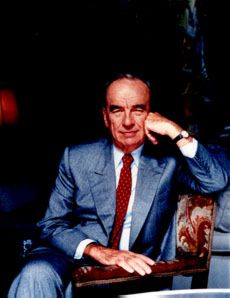
Murdoch entered the U.S. media market in the 1970s by purchasing newspapers and magazines, and he also started the supermarket tabloid, The Star. But it was not until the mid-1980s that Murdoch began to make his mark on American television. His purchase of Metromedia's independent television stations from John Kluge in 1985 came on the heels of his acquisition of the 20th Century-Fox studio. Murdoch saw the situation as a rare opportunity to purchase a group of choice television stations in the country's largest markets, thereby ensuring a distribution vehicle for his new studio's programs. The combined moves allowed Murdoch to initiate the most serious effort to establish a fourth broadcast television network since the demise of DuMont in the mid-1950s, and culminated in the establishment of the FOX Broadcasting Company.
Despite his career's many successes, Murdoch's empire nearly collapsed in 1990. Unfavorable conditions in the financial markets, combined with deep losses by some of News Corp.'s start-up operations, such as BSkyB, and the company's extremely heavy short-term debt load (the result of many costly acquisitions, such as TV Guide, which was purchased in 1988 from Walter Annenberg's Triangle Publications), brought the company to the brink of financial ruin. While Murdoch was able to renegotiate the terms of his agreements, which avoided the disaster, it temporarily placed Murdoch in the unusual position of being unable to aggressively expand News Corp.'s holdings. In fact, he was forced to shed some non-essential assets, including most of his U.S. magazine titles. It was only a relatively short time, though, before the company's financial picture improved significantly, and Murdoch was able to once again resume his familiar patterns of acquisition, as he did when he purchased a controlling interest in Asia's Star-TV DBS service in 1993.
As perhaps befits a man with such a great level of power and influence, Murdoch has often found himself at the center of political firestorms. He became widely scorned by labor organizations and pro-labor politicians around the world because of his hardline tactics in battling the British newspaper workers' unions in the mid-1980s. His 1985 purchase of the Metromedia television stations required him to become an American citizen to comply with Federal Communications Commission (FCC) restrictions on foreign ownership of U.S. television stations; many felt he received inordinately preferential treatment by the Reagan administration in expediting the citizenship process. His FOX television network was able to avoid complying with the FCC's Financial Interest and Syndication (FinSyn) rules, first, by airing fewer hours of programming than was required to define FOX as a "network," and later, by receiving a temporary FCC waiver of the rules--an action the other three broadcast networks vigorously opposed. Also, Murdoch was the specific target of a 1988 effort by Senator Edward Kennedy--at the time, a frequent target of Murdoch's Boston Herald newspaper--to revoke another FCC waiver, one that waived cross-ownership restrictions that would have prevented Murdoch from owning both newspapers and television stations in New York and Boston. The end result of Kennedy's efforts was that Murdoch eventually sold the New York Post (he later would receive a new waiver that allowed him to reacquire the struggling paper in 1993), and put Boston's WFXT-TV into an independent trust.
A mid-1990s political storm held the potential to be the most costly that had ever surrounded Murdoch. Nearly ten years after he had become an American citizen, and after many millions of dollars had been invested in the FOX network and its owned-and-operated stations, questions arose related to Murdoch's avoidance of the FCC's restrictions on foreign ownership of television stations. The National Association for the Advancement of Colored People (NAACP), which was seeking to block the purchase of a Philadelphia television station by FOX, asked the FCC to investigate whether it was Murdoch who owned the FOX stations, as he and News Corp. claimed, or whether Australian-based News Corp. was the legal owner, which would be in violation of the rules. NBC joined the NAACP in asking the FCC to pursue the investigation, but eventually withdrew from the complaint after gaining access for their programming on Murdoch's Star-TV service in Asia. However, the NAACP continued to pursue the issue.
Rupert Murdoch has been one of the most successful international entrepreneurs of his time, and a lightning rod for controversy in many parts of the world. While other global media companies, such as Time Warner and Bertelsmann A.G., possess power and influence that compare to that of News Corp., Murdoch often appears to stand alone among the ranks of modern media moguls. This is because unlike those other companies, News Corp. is clearly identified as a corporate arm that is strongly controlled by a single individual. It is therefore probably fair to say that his absolute control over News Corp., with its holdings of some of the world's most pervasive and influential media properties, makes Rupert Murdoch perhaps the single most powerful media magnate ever.
